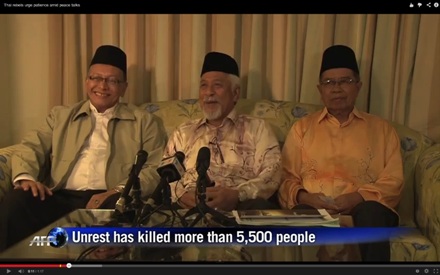Ceasefire, bargaining power and the future of peace talks
The above headline was not intended to pick on the government over its handling of the unrest problem in the Deep South. Honestly, I wish to applaud Prime Minister Yingluck Shinawatra and her government for adopting a pro-active approach towards the problem, including the open peace talks with the Barisan Revolusion Nasional separatist group and the meeting with the secretary-general of the Organisation of Islamic Conference (OIC).

Nevertheless, I would like to take this opportunity to express my view on the ceasefire issue in order to present the other side of the statement: "cessation of violence during the holy month of Ramadan". I am not against peace because ceasefire, even if it lasts just one day , is a good sign. But the objective of the ceasefire is an interesting issue worthy of an analysis.
Besides the wordings in the ceasefire announcement which read "common understanding" delivered on July 12, 2013, there are several points which can become a problem in the future, especially the inclusion of Sadao district of Songkhla in the ceasefire plan. The other point is: what is the real purpose of the BRN’s demand of 40-day "cessation of violence or ceasefire".
My personal assumption is that the ceasefire was intended to strengthen the bargaining power of the BRN rather than the real desire to sue for peace. The reason is that if the separatist group really wants to put an end to violence for good and to resort to peace talks process, it should not have set a timeline for the ceasefire. And if there is violence during the ceasefire by some splinter separatist groups, then the BRN could intervene to end the violence. This will convince the government to respond more positively towards the BRN’ demands such as the demand for troop withdrawal.
It is highly possible that this provisional ceasefire is just a ceasefire to build up bargaining power of the BRN and, after that, violence will resume like the escalation of violence before the start of the Ramadan as evident in the deadly bombing which killed eight soldiers.
It is quite normal for the BRN to make use of the ceasefire to increase its bargaining power but whether it is ethical or not is a separate issue. But my question is whether the government is prepared to deal with this problem – BRN’s bargaining power.
In my previous articles in the same column, I warned that we should not under-estimated the BRN because, if this separatist group, could put an end to the violence, they could pose a real problem to the government in the negotiating table.
Although the separatist movement might be fragmented, the various separatist groups could cooperate with one another on tactical aspect as they stand to benefit and, as such, they can strengthen their bargaining power in dealing with the government.
Many people have started talking about "special administrative zone" for the Deep South now that the dream for a "separate homeland" appears to be far-fetched. Perhaps "special administrative zone" or an "autonomous zone" is more achievable for the separatists.
The inclusion of Sadao district into the ceasefire plan could be a part of the BRN’s vision for a special administrative zone because of the district’s economic powerhouse which has generated a total revenue of up to 500 billion baht a year from its two-way trade flow between Thailand and Malaysia.
The Ramadan ceasefire plan came as a total surprise after the BRN threatened to walk out of the peace talks process unless the government accepted its 7-8 demands. Going back a bit to a statement made by Malaysian prime minister Najib Razak during a seminar in June that Muslims who are the minority in Asean countries should stop thinking about a separate homeland while the host countries should respect the minority Muslims’ right to self-determination. Najib used the word "autonomy".
Is this the final answer to the unrest problem in the Deep South from Malaysia and from a powerful former prime minister of Thailand?
Is it possible that the ongoing peace talks are just a protocol that the powers-that-be set up while waiting for the time to ripen and the society is ready to accept the ready-made solution – that is the "special administrative zone" for the Deep South?
-----------------------------------------------------------------------------------------------------------------------
Note : This article was translated from editorial of Isra News Center "หยุดยิง กับ อำนาจต่อรอง และอนาคตของโต๊ะพูดคุยสันติภาพ" http://bit.ly/15Z5fDs
